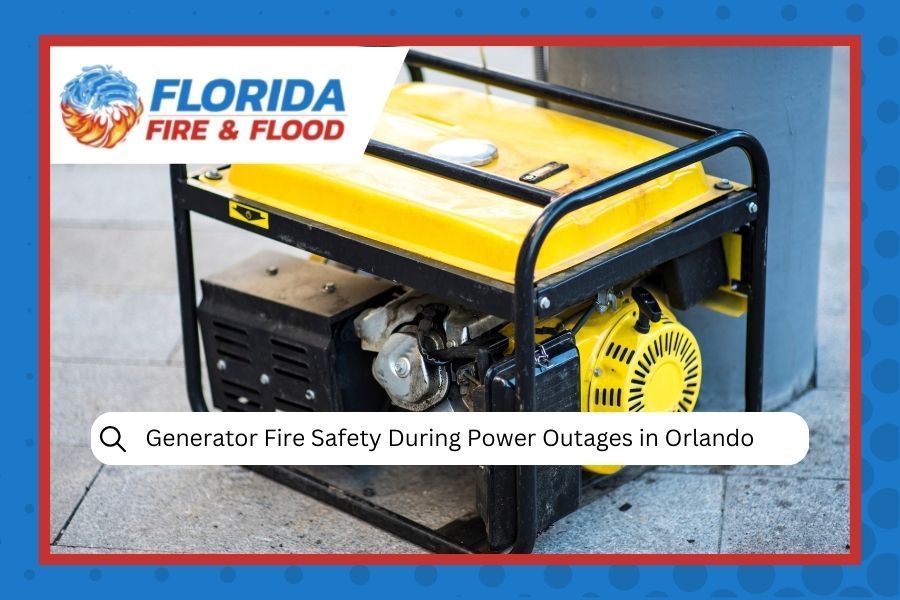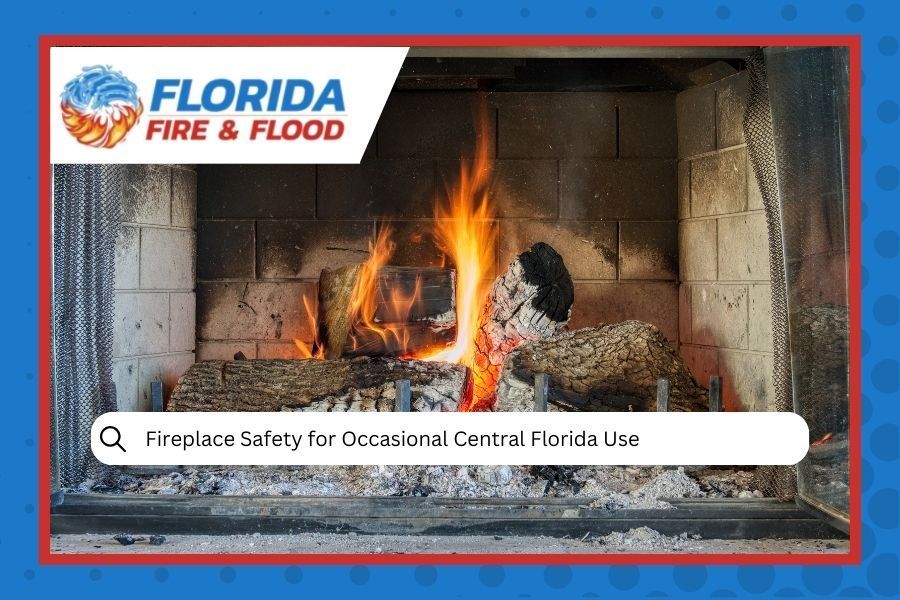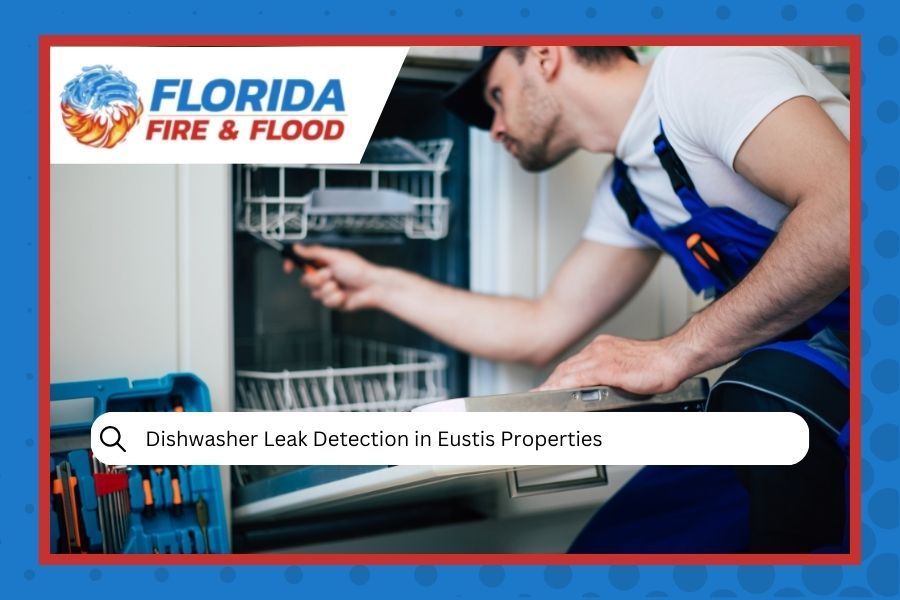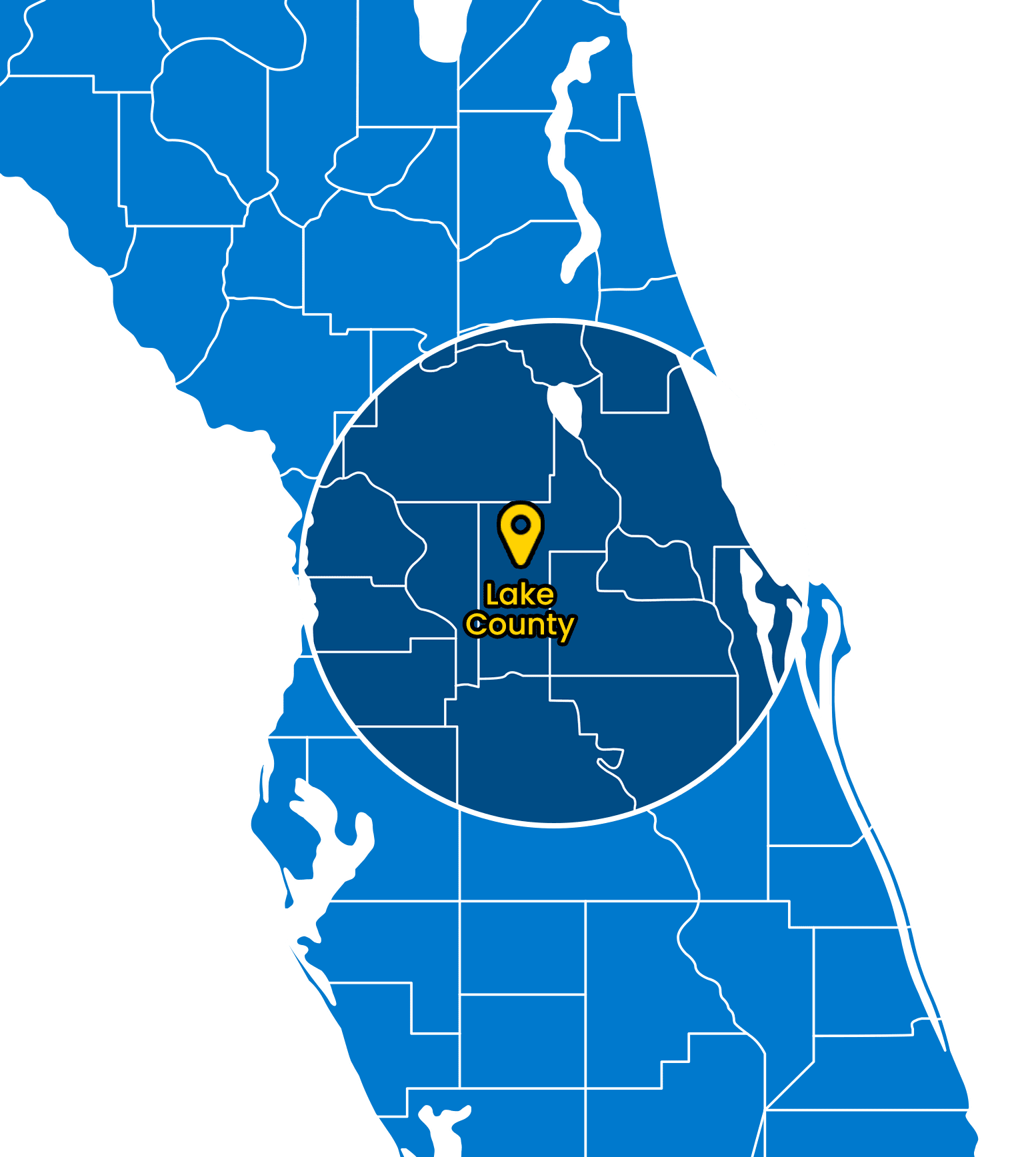AMRT - Applied Microbial Technician I, (Mold Remediation)
Jump to Section:
When the lights go out in Orlando, generators become lifelines. Whether it's hurricane season rolling through Central Florida or an unexpected storm knocking out power, that trusty generator humming in your backyard can feel like a hero. But here's the thing – generators can go from hero to hazard faster than you'd think if you're not careful.
We've seen our fair share of generator-related incidents during our years serving Central Florida communities. That's why our team at Florida Fire & Flood wants to share some straight talk about keeping your family safe while keeping the power on. After all, the last thing you want during an already stressful power outage is dealing with fire damage restoration afterward.
Why Generator Safety Matters More Than You Think
Let's be honest – most of us don't think about generator safety until something goes wrong. We're focused on keeping the AC running, the fridge cold, and our phones charged. But generators are essentially small engines that create electricity, and with that comes real fire risks.
Every year, we respond to calls where a simple power outage turned into something much worse because of preventable generator mistakes. The good news? Most generator fires are completely avoidable when you know what you're doing.
The Real Risks You're Dealing With
Generators pose several fire hazards that many homeowners don't consider:
- Carbon monoxide buildup leading to poor ventilation decisions
- Overheating from improper placement or overloading
- Fuel spills and improper storage
- Electrical issues from faulty connections
- Extension cord problems that can spark fires

Carbon monoxide detectors are essential safety equipment when using generators, providing your last line of defense against this invisible killer.
Need Generator Fire Damage Restoration?
If you're already dealing with generator-related fire damage, time is critical. Our IICRC-certified team is available 24/7 to help Central Florida families recover quickly.
Get Emergency Help NowEssential Generator Fire Safety Tips for Orlando Residents
Location, Location, Location
Never run your generator indoors. Seriously, not in the garage, not in the basement (though most Central Florida homes don't have those anyway), not in the shed. Generators need to be at least 20 feet away from your home, and that includes windows, doors, and vents.
We get it – Florida weather can be unpredictable. You don't want your generator getting soaked in a sudden downpour. But running it under a covered patio or too close to your house creates dangerous carbon monoxide risks and increases fire potential.
Pro tip: If you're worried about weather, invest in a generator tent or canopy specifically designed for this purpose. Your safety is worth the extra expense. The U.S. Consumer Product Safety Commission provides comprehensive safety guidelines that every generator owner should review.

Properly installed whole house generators provide safer power during Central Florida's hurricane season when positioned and maintained correctly.
Fuel Safety That Could Save Your Home
Here's where things get interesting – and potentially dangerous. Fuel handling is where we see a lot of preventable mistakes:
Before you start:
- Always let your generator cool completely before refueling
- Store fuel in approved containers, away from heat sources
- Never store gasoline in your house or attached garage
- Keep fuel containers at least 10 feet from the generator while it's running
During refueling:
- Turn off the generator and let it cool for at least 15 minutes
- Use a funnel to prevent spills
- Clean up any spilled fuel immediately
- Don't smoke or use open flames anywhere near fuel or the generator
The cooling period is crucial. Hot engines and gasoline don't mix well. We've responded to calls where homeowners tried to "quickly top off" a running generator and ended up with fuel fires that spread to nearby structures.
Generator Safety Distance Requirements
| Item | Minimum Distance | Why It Matters |
|---|---|---|
| House/Building | 20+ feet | Prevents CO buildup and fire spread |
| Windows/Doors | 20+ feet | Blocks exhaust from entering home |
| Fuel Storage | 10+ feet | Reduces ignition risk from heat |
| Dry Surface | Required | Prevents electrical hazards |
Electrical Safety: Don't Let Convenience Become Catastrophic
Avoid the extension cord maze. We've all seen it – extension cords snaking through windows, under doors, creating a tangled web of potential problems. Here's the reality: every connection point is a potential failure point.
Instead:
- Use heavy-duty, outdoor-rated extension cords designed for generator use
- Keep cords away from heat sources and walking areas
- Inspect cords regularly for damage, fraying, or wear
- Consider having a transfer switch installed by a qualified electrician
Never plug your generator directly into a wall outlet. This practice, called "backfeeding," is extremely dangerous and can electrocute utility workers or cause fires in your electrical system.
Regular Maintenance: Your First Line of Defense
Like any engine, generators need regular care to operate safely:
Monthly checks:
- Oil levels and condition
- Air filter cleanliness
- Fuel line integrity
- Spark plug condition
Seasonal preparation:
- Professional tune-ups before hurricane season
- Fuel system cleaning
- Load testing to ensure proper operation
- Battery testing for electric start models
The American Red Cross offers detailed maintenance and safety guidelines developed with input from the CDC and National Fire Protection Association.
What to Do If Something Goes Wrong
Even with all the precautions, emergencies can happen. Here's your action plan:
If you smell gas or see fuel leaking:
- Turn off the generator immediately if you can do so safely
- Move everyone away from the area
- Call 911 if there's any immediate danger
- Don't restart until the problem is resolved
If you see sparks or electrical issues:
- Shut down the generator using the proper procedure
- Don't touch any electrical components
- Have a qualified technician inspect before restarting
If a fire starts:
- Call 911 immediately
- Don't try to fight electrical or fuel fires with water
- Evacuate the area and let professionals handle it
Remember, no generator or power restoration is worth risking your family's safety. When in doubt, shut it down and contact us or emergency services.
Hurricane Season: When Generator Use Peaks in Central Florida
Living in Orlando means hurricane season is a fact of life. When those storms roll through and knock out power for days, generators become essential equipment. But this is also when we see the most generator-related incidents.
Before the storm:
- Test your generator well before you need it
- Stock up on proper fuel and store it safely
- Review your safety checklist with family members
- Consider professional inspection if it's been idle for months
During the outage:
- Follow all safety protocols, even when you're stressed or tired
- Take turns monitoring the generator with family members
- Don't let fatigue lead to shortcuts or poor decisions
- Keep a fire extinguisher rated for electrical and fuel fires nearby
The stress of a major storm can make anyone rush through normally careful procedures. That's exactly when accidents happen. Understanding the full fire damage restoration process can help you appreciate why prevention is so much better than dealing with the aftermath.
Generator Fire Prevention Checklist
Print this out and keep it with your generator supplies:
Before Each Use:
- Check fuel levels and inspect for leaks
- Verify generator is at least 20 feet from structures
- Ensure area around generator is clear of debris
- Check that exhaust is pointing away from buildings
- Inspect all electrical connections and cords
- Confirm carbon monoxide detectors are working in your home
During Operation:
- Monitor generator regularly but maintain safe distance
- Keep fuel containers properly stored and away from heat
- Watch for any unusual sounds, smells, or performance issues
- Never leave generator unattended for extended periods
- Turn off and cool down before any maintenance or refueling
After Use:
- Allow generator to cool completely before storage
- Store in dry, ventilated area away from living spaces
- Run generator dry or use fuel stabilizer for long-term storage
- Document any issues for future maintenance
Beyond Prevention: When Professional Help Is Needed
Sometimes, despite our best efforts, things go wrong. We've helped many Central Florida families recover from generator-related incidents, and we've learned that quick, professional response makes all the difference.
If you're dealing with fire damage from a generator incident, time is critical. Smoke and soot damage can continue spreading and causing problems even after the immediate danger is over. Our team understands the unique challenges of fire damage restoration in Orlando and can respond quickly to minimize long-term damage.
We've also seen cases where generator exhaust or fuel spills created indoor air quality issues that required professional remediation. It's not just about visible fire damage – there can be hidden problems that need expert attention. Sometimes generator incidents also involve water damage from firefighting efforts , creating complex restoration situations.
24/7 Emergency Restoration Services
Our IICRC-certified team responds within one hour to help Central Florida families recover from fire and water damage. Don't wait – call now for immediate assistance.
Fire Damage Services Call (352) 644-7969Local Resources and Professional Support
Central Florida has specific challenges when it comes to generator safety. Our climate, hurricane exposure, and housing types create unique considerations. That's why it's important to work with professionals who understand our area.
For generator installation and maintenance, always use licensed electricians familiar with Florida codes. For fire safety planning, connect with your local fire department – many offer home safety inspections and advice.
If you're interested in seeing how we handle complex restoration situations, check out our case study on tackling full house fire restoration in Ocala. While this particular case wasn't generator-related, it shows the comprehensive approach needed when fire affects a home.
Remember, being prepared isn't just about having the right equipment – it's about knowing how to use it safely. Understanding the leading causes of house fires can help you see the bigger picture of home fire safety.
The Bottom Line on Generator Safety
Here's the truth: generators are incredibly useful tools that can make power outages much more manageable. But they're also powerful machines that demand respect and proper handling. The few extra minutes you spend following safety protocols could save your home, your family, and your peace of mind.
We hope you never need our restoration services, but if you do, know that our IICRC-certified team is here 24/7 to help Central Florida families recover from fire damage. Because at the end of the day, we're not just a restoration company – we're your neighbors, and we want to keep our community safe.
Stay prepared, stay safe, and don't hesitate to reach out if you have questions about fire safety or restoration services. After all, an ounce of prevention is worth a pound of cure – especially when it comes to protecting your home.







